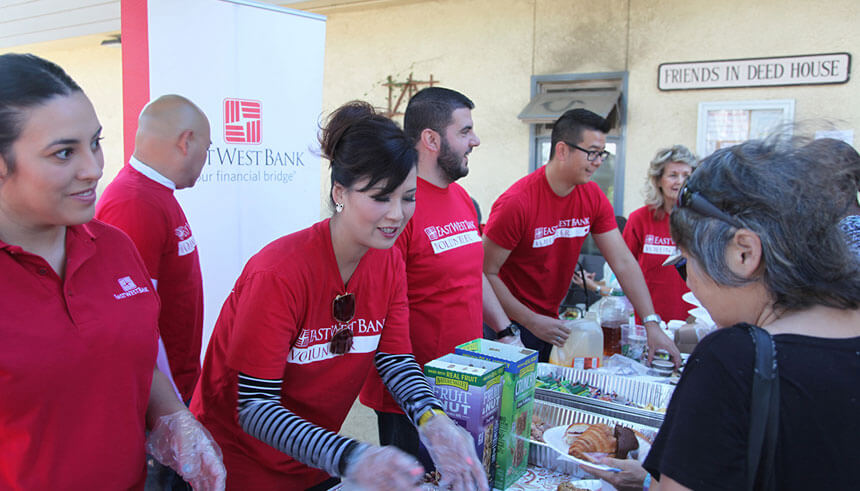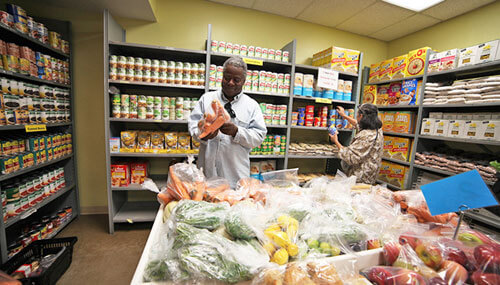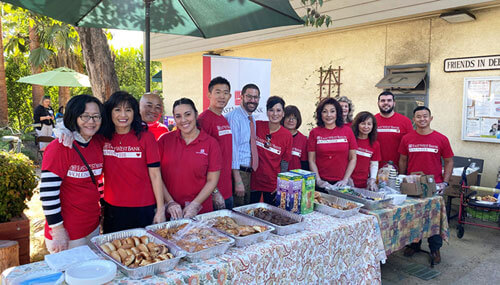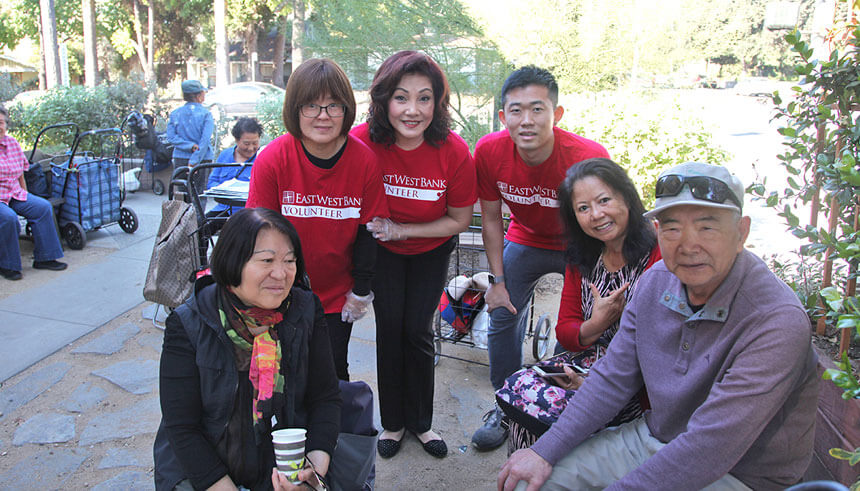East West Lifestyle
Friends In Deed: Helping People in Need
By

Providing food, shelter and preventative services to seniors and people at risk of becoming homeless
Although it’s early on a Wednesday morning, there is a small crowd forming outside of Friends In Deed, a nonprofit organization in Pasadena, California, that provides supportive services for people who are homeless or at risk of homelessness. Some people are lining up for the complimentary breakfast of fruits, pastries and granola bars that East West Bank volunteers are serving, while others are waiting for the organization’s food pantry and other services to open up for business.
“They have everything,” says Maurice Grissom, a local senior resident who comes to Friends In Deed’s food pantry to get groceries for himself and his sister. He likes to “shop” at their food pantry because of the choice afforded to him.
Giving people like Grissom the ability to choose is what sets Friends In Deed apart from some other organizations. “Friends In Deed is a great partner to have in Pasadena that does great work for the community, especially in homeless prevention,” says Renee Chang, senior vice president and regional manager of consumer banking at East West Bank, who led the team of volunteers serving breakfast at Friends In Deed. “Teamwork is the ability to work together towards a common vision. Coming together and sharing a similar goal of making the world a little better is what we’re all about.”
Friends In Deed puts considerable effort into making people feel welcome and accepted. Even the simple act of giving people a choice gives them a greater sense of human compassion and dignity.
“People come here because we don’t just give them a bag of food,” says Rabbi Joshua Levine Grater, the executive director of Friends In Deed. “We’re set up like a little market, and you get to shop a number of items based on your family size and get to pick the foods that you like, that your family likes, that you’re not allergic to, that your kids like.”
The food pantry is just one of the services that Friends In Deed provides. They have a bad weather shelter, located in the gymnasium of the Pasadena Covenant Church, for when the forecast is predicted to drop to 40 degrees or lower, or if there is at least a 40 percent chance of rain. Friends In Deed also offers street outreach and homelessness prevention services, as well as a daytime women’s room that provides refuge to women who are alone and homeless or at risk of homelessness.

“People come here because we don’t just give them a bag of food. We’re set up like a little market, and you get to shop a number of items based on your family size and get to pick the foods that you like, that your family likes, that you’re not allergic to, that your kids like.”
In particular, the Women’s Room is a program that’s unique to Friends In Deed. Each day, about 20-35 women utilize the program’s services, which range from servicing basic needs like showers and laundry, to giving women access to phones and computers, to leisure activities like arts and crafts and cultural field trips. It’s the only program like it in San Gabriel Valley, says Rabbi Grater.
Prevention is the best way to eliminate homelessness
Friends In Deed’s programs are focused on homelessness prevention. Most of the people who come to the food pantry are not homeless, shares Rabbi Grater, but need that extra assistance to help make rent.
“They’re mostly seniors who are on fixed income, have Social Security,” he explains. “We’re supplementing so they can get a week’s worth of food so they can pay their rent and have the ability to not become homeless—because that’s the crux of it.”
In a city where the average monthly cost of an apartment is around $2,400, any additional support is crucial to keeping them housed—and prevention is the best way to fight homelessness, believes Rabbi Grater.
Friends In Deed also offers a dedicated homeless prevention program that provides short- and medium-term rental assistance, which benefits about 70 people each year. “People come to us when they are about to be evicted,” he says. “We’ve given about an average of $2,500 a family to keep them housed.”
It’s programs like these where community partners are especially crucial, says Rabbi Grater. Although Friends In Deed receives government funding through the city of Pasadena to provide assistance, those funds have tight restrictions placed on them. For instance, in order to receive government funds, the people who need aid need to meet certain requirements, such as living in Pasadena and being within a set income limit. Unfortunately, a lot of people who need assistance “make too much money” based on the U.S. Department of Housing and Urban Development’s definitions of poor and low-income, explains Rabbi Grater.
However, with grants from partners like East West Bank, Friends In Deed is able to use their own discretion on how to best use the funds, which can help many more people who wouldn’t have fit the governmental requirements.
"We’re doing our best to make them feel welcome, and trying as best we can to get a way that they can communicate and make them feel human in their daily lives."

“East West has been a wonderful partner,” says Rabbi Grater. “They have given us very generous grants for the last three years. That has helped our Women’s Room, that has gone to help our street outreach program, and that has been really helpful in providing unrestricted funds to give us a lot of latitude to do the work that we think is most important.”
Chang adds that she and her team enjoy volunteering in person and being able to see the positive effect simple gestures like providing breakfast has on the local residents. “When we hosted the breakfast, you can see their faces light up with joy,” she says. “With the wonderful volunteers and team members at Friends In Deed, we truly enjoy being a part of the Pasadena community and strive to continue to do so.”
Fostering a sense of community
Friends In Deed certainly provides a lot of supportive services, but it just as importantly gives people a sense of community, although that can sometimes be a challenge when there are language barriers involved.
“We have a lot of Chinese folks here,” shares Rabbi Grater. “We do have a few Mandarin speakers that are volunteers. When they can talk, they’re human beings, and they feel that they’re welcome here. We’re doing our best to make them feel welcome, and trying as best we can to get a way that they can communicate and make them feel human in their daily lives.”

However, despite the occasional language challenge, the people who seek support from Friends In Deed have formed their own small communities. As they wait their turn to shop the food pantry (it works on a lottery system, where each person gets a number that marks their place in line), small groups of people are chatting with one another, including Grissom and his friend L.F. Garcia.
“We’re all in the same boat,” says Garcia about the camaraderie he’s found at Friends In Deed. “We’re in need.”
But that doesn’t mean they don’t still help each other out when they can. When Garcia arrived to the food pantry, he received the number one slot in Friends In Deed's lottery system but decided to give his place to someone else. “You see that little girl with the red sweater?” says Garcia, gesturing to a woman sitting with her young daughter. “She’s number one now.”
Grissom couldn’t agree more. “If we know you get here, take my number—it’s first. He (Garcia) gave me his number one time—number three,” he shares. “Oh my god, I was so happy I was able to go—I was like 40 or 50? That’s how we act around here.”
Subscribe to the Reach Further Newsletter
Get inspiring stories in your inbox every month.

